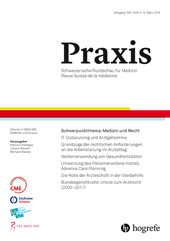Abstract
Zusammenfassung. Die Abgabe von Natrium-Pentobarbital (NaP) im Rahmen des assistierten Suizids setzt eine ärztliche Verschreibung voraus. Diese hat den gesetzlichen und standesrechtlichen Anforderungen sowie den entsprechenden ethischen Richtlinien zu genügen. Die derzeitige Rechtspraxis lässt die Suizidbeihilfe in dieser Form restriktiv zu, namentlich im Falle von sterbewilligen Patienten, deren Tod absehbar ist. Die neuen Richtlinien der SAMW (2018) erweitern die Möglichkeit auf Patienten, die aufgrund von Krankheitssymptomen und/oder Funktionseinschränkungen unerträglich leiden. Die Verschreibung von NaP in anderen Fällen oder in Verletzung der in den Richtlinien vorgesehenen Sorgfaltspflichten kann zu aufsichts-, standes- und strafrechtlichen Konsequenzen führen. Die Suizidbeihilfe selbst ist eine Gewissensentscheidung, keine ärztliche Aufgabe, weshalb auch kein Anspruch darauf besteht.
Abstract. The delivery of sodium pentobarbital as part of assisted suicide requires a doctor’s prescription. This prescription must meet the legal and professional requirements as well as the corresponding ethical guidelines. Current legal practice restrictively permits suicide assistance in this form, especially in the case of patients who are willing to die and whose death is foreseeable. The new guidelines of the SAMS (2018) extend the possibility to patients who suffer intolerably due to disease symptoms and/or functional restrictions. The prescription of NaP in other cases or in violation of the duty of care provided for in the guidelines may result in supervisory, professional and criminal consequences. Suicide assistance itself is a decision of conscience, not a medical task, which is why there is no entitlement to it.
Résumé. L’administration de pentobarbital sodique (NaP) dans le cadre d’un suicide assisté nécessite une ordonnance médicale. Ceci doit satisfaire aux exigences légales et professionnelles ainsi qu’aux directives éthiques correspondantes. La pratique juridique actuelle autorise de manière restrictive l’assistance au suicide sous cette forme, en particulier dans le cas des patients qui sont prêts à mourir et dont le décès est prévisible. Les nouvelles directives de l’ASSM (2018) étendent cette possibilité aux patients qui souffrent de façon intolérable en raison de symptômes de maladie et/ou de restrictions fonctionnelles. La prescription de NaP dans d’autres cas ou en violation de l’obligation de diligence prévue dans les directives peut entraîner des conséquences prudentielles, professionnelles et pénales. L’aide au suicide en soi est une décision de conscience et non un devoir médical, c’est pourquoi elle n’est pas assujettie audroit.
Bibliografie
BGE 133 I 58, E. 6.1., mit zahlreichen Hinweisen.
: Betäubungsmittelgesetz (BetmG): Kommentar zum Bundesgesetz über die Betäubungsmittel und die psychotropen Stoffe. Basel; N 5 zu Art. 1b BetmG. 2016.
Bundesblatt19993511.
BGE 133 I 58, E. 4.2.1.
: Die Regelung der Suizidbeihilfe in den neuen SAMW-Richtlinien.
Schweiz Arzteztg 2018; 99: 1392–1396.BGE 133 I 58 E. 6.3.4; Fellmann W, N 67 zu Art. 40 MedBG . In: (Hrsg.):Medizinalberufegesetz (MedBG): Kommentar . Basel2009.: N 18 zu Art. 11 Abs. 1 BetmG.
Hürlimann D:
Umstrittene Suizidhilfe am Lebensende. NZZ 12.10.2018 ; In: (Hrsg.).Der organisierte Tod: Sterbehilfe und Selbstbestimmung am Lebensende – Pro und Contra . Zürich; Orell Füssli: 2012.BGE 127 I 6, E. 5a; BGE 133 I 58, E. 6.1.
BGE 133 I 58, E. 6.2.1.
BGE 133 I 58, E. 6.2.1.
Zum Ganzen BGE 133 I 58, E. 6.3.2.
BGE 133 I 58, E. 6.3.2.
Urteil 2P.310/2004 vom 18. Mai 2005, E. 4.3 mit Hinweisen; BGE 133 I 58, E. 6.3.4.
Urteil des Verwaltungsgerichts des Kantons Zürich vom 15. Juli 1999, E. 4e, In:
Schweizerisches Zentralblatt für Staats- und Verwaltungsrecht 101/2000 , S. 489 ff.; BGE 133 I 58, E. 6.3.4.Vgl. BGer 2C_9/2010 vom 12. April 2010; BGer 2C_410/2014 vom 22. Januar 2015.
Siehe BGer 2C_608/2017 vom 24. August 2018.
Gavela K: Ärztlich assistierter Suizid und organisierte Sterbehilfe.



